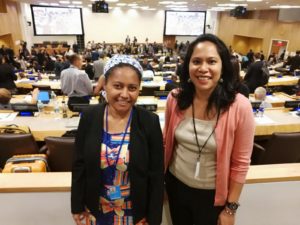
DAWN’s Program Officer, Mereoni Chung, attended the first session of the Intergovernmental Conference on an international legally binding instrument on the conservation and sustainable use of marine Biodiversity of areas Beyond National Jurisdiction (BBNJ), which took place at the UN Headquarters in New York from 4th-17th September 2018.
Mereoni partnered with Lice Cokanasiga, from the Pacific Network on Globalisation (PANG) to attend the Conference and to strategize on concerns and priorities for this process towards the international legally binding instrument. This DAWN/PANG’s collaborative engagement is prompted by shared development concerns – the ocean is the earth’s last frontier, and interest in mining it for its considerable resources, both marine biological including genetic resources, and rare earth metals used in advanced (including ironically green) technologies, is growing, not only among corporate entities but also among states.
The DAWN/PANG team observed proceedings and engaged with representatives of the Women’s Major Group (WMG) and the Pacific region, as state members expanded discussions on substantive elements to be addressed through this treaty process, including Guiding Principles and Approaches, financing, and furthering priorities on Capacity Building and Transfer of Marine Technology (CB/TT), Area Based Management Tools (MPAs) including MPAs, Environmental Impact Assessment (EIA), and Marine Genetic Resource (MGR).
While the deliberation on the legally binding instrument continues, DAWN looks forward to further elaboration on elements pertaining particularly to:
- Strong accountability provisions under the new Treaty to govern access to and use of the ocean areas by corporations and states;
- Adherence to existing international binding agreements, obligations and principles, including the right to development, right to a livelihood, obligation to prevent transboundary harm, the principle of free, prior and informed consent, practice of precautionary principles and the Paris Agreement on Climate Change;
- Mandatory independent environmental and social impact assessments of proposed industrial activities; and
- Equity in benefit sharing, including gender-equitable sharing of training opportunities and benefits from marine scientific and genetic research, and inter-generational equity, to protect the interests and rights of future generations.
About the BBNJ process
The UN Resolution 69/292 and 72/249 signaled the development of an internationally legally binding instrument under the UN Convention on the Law of the Sea (UNCLOS) on the conservation and sustainable use of marine biodiversity in areas beyond national jurisdiction.
This historical new treaty will be the third global governance mechanism under UNCLOS, but the first aimed specifically at protecting marine biological diversity in the high seas. There are complex challenges and conflicting interests in the process to negotiate for the health of the ocean that balances conservation and the use of ocean resources.
The first Conference concluded with an agreement to move towards developing a guiding document that would kickstart text deliberations and pave-way to the aspirations of adopting an international legally binding instrument under UNCLOS. This process will feature three more Conferences, two in 2019 and one in 2020.
